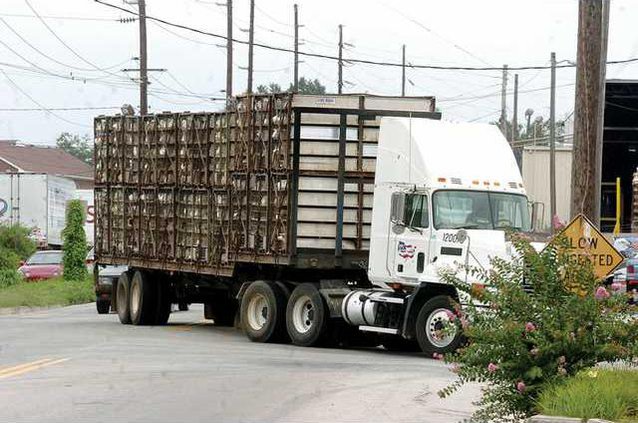In remarks to poultry industry representatives this week, Georgia Commissioner of Agriculture Tommy Irvin said things were tough in the poultry industry.
"It’s as tough as I’ve seen it in a long time,"
Irvin said.
That’s no news to the industry which is facing dual pressures of increased feed and transportation costs.
The good news is that demand for poultry is strong, especially in export markets like China. The bad news is that prices are not keeping up with costs, causing many poultry companies to lose money.
Pilgrims Pride, the nation’s largest poultry company, already is projecting a loss for the third quarter. The company already has closed a North Carolina processing plant and six distribution centers, resulting in 1,100 job losses.
The company which operates a plant in Gainesville, said its third quarter feed costs were up $266 million from the same period a year ago. The company’s costs for natural gas were up 110 percent, and the cost of diesel fuel climbed by 63 percent.
Figures from the Georgia Poultry Federation in Gainesville showed additional monthly production costs associated with increased feed prices are a combined $79 million per month for all poultry companies operating in Georgia.
"The key point is that the true impact of higher feed costs haven’t been fully realized at the consumer level yet," said Mike Giles, senior vice president of the Georgia Poultry Federation. "The food inflation that is happening now is in part due to other factors such as increased energy and transportation costs as well as export demand."
The market price for poultry is either the same, or lower than a year ago.
In a report prepared for investors, Pilgrim’s Pride showed prices in July were about 20 cents a pound less for boneless, skinless chicken breast. Prices for whole chickens and leg quarters were about the same.
Fieldale Farms, one of the largest Northeast Georgia poultry companies, announced this week that it was laying off 20 administrative personnel and leaving 10 more positions vacant. Company officials have said that higher feed prices are costing an additional $2 million per week.
Tyson, another major player in poultry, reported a $44 million loss in the most recent quarter and predicts it could go higher in the current quarter.The price of corn, a key ingredient has increase by more than $2 a bushel in less than a year.
Much of that increase is attributed to the demand for corn for use in production of ethanol. And Georgia officials believe that demand is only going to increase.
A federal mandate called the Renewable Fuel Standard volume requires that an increasing amount of ethanol be blended into gasoline. The standard was 4.7 billion gallons in 2007, 9 billion in 2008, and it steadily rises to 15 billion gallons in 2015. In 2007, one fourth of the corn crop was used to produce 6.5 billion gallons of ethanol.
"Our concern is the cumulative effect of this federal policy," Giles said. "What percentage of the corn supply will it take to produce 15 billion gallons of ethanol in 2015? The unknown is the number of acres and yield over this period, but it is clear that we are setting up a situation where there is increasing demand from ethanol and a tightening supply of corn for traditional uses of corn for food."
The increased price for corn has caught the attention of Georgia farmers, who had traditionally grown other crops, such as peanuts.
With higher corn prices, Georgia farmers planted 450,000 acres last year, the largest acreage in at least five years. They planted 320,000 acres this year, according to the Georgia Agricultural Statistics Service.

